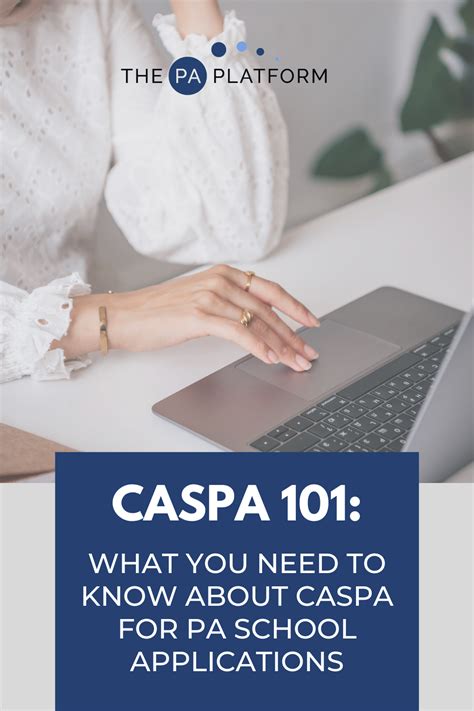The Centralized Application Service for Physician Assistants (CASPA) is a crucial step in the process of becoming a Physician Assistant (PA). One of the most significant concerns for aspiring PAs is the CASPA application cost. In this article, we will break down the costs associated with the CASPA application process, what to expect, and provide valuable insights to help you prepare.
Understanding the CASPA Application Process
Before we dive into the costs, it's essential to understand the CASPA application process. CASPA is a centralized application service that allows applicants to apply to multiple PA programs using a single application. The process typically begins in April or May for the upcoming application cycle, and the deadline varies by program.
CASPA Application Fees
The CASPA application fee is a critical component of the application process. The fees are as follows:
- Initial application fee: $177
- Additional program fee: $55 per program
- Transcript processing fee: $10 per transcript
These fees are non-refundable, so it's essential to carefully review the application requirements and ensure you meet the eligibility criteria before submitting your application.
Other Costs to Consider
In addition to the CASPA application fees, there are other costs to consider:
- Transcripts: You will need to request official transcripts from each institution you've attended, which may incur additional costs.
- Letters of Recommendation: You may need to provide a small stipend or gift card to your recommenders as a gesture of appreciation for their time and effort.
- Personal Statement Editing: You may choose to hire a professional editor to review and edit your personal statement, which can range from $100 to $500.
- Interview Preparation: You may choose to prepare for interviews by purchasing preparation materials or attending workshops, which can range from $50 to $500.
Total Estimated Cost
The total estimated cost of the CASPA application process can range from $300 to $1,000 or more, depending on the number of programs you apply to and the additional costs mentioned above.

Tips to Reduce Costs
While the CASPA application process can be costly, there are ways to reduce costs:
- Apply to fewer programs: While it may be tempting to apply to multiple programs, applying to fewer programs can save you money on application fees.
- Request transcripts early: Requesting transcripts early can save you money on rush fees and ensure that your transcripts are received by the deadline.
- Prepare your personal statement carefully: Avoid hiring a professional editor by preparing your personal statement carefully and having it reviewed by friends, family, or mentors.
- Prepare for interviews: Prepare for interviews by researching the program, practicing common interview questions, and using free online resources.
Conclusion
The CASPA application process can be costly, but with careful planning and preparation, you can reduce costs and increase your chances of success. By understanding the application fees, additional costs, and tips to reduce costs, you can create a budget and plan that works for you.
Why Choose CASPA?
CASPA is the primary application service for PA programs, and for good reason. Here are just a few reasons why you should choose CASPA:
- Convenience: CASPA allows you to apply to multiple PA programs using a single application, making the process more convenient and efficient.
- Simplified Application Process: CASPA streamlines the application process, reducing the administrative burden on applicants and programs.
- Standardized Application: CASPA uses a standardized application, ensuring that all applicants are evaluated using the same criteria.

CASPA Application Requirements
To ensure a smooth application process, it's essential to understand the CASPA application requirements:
- Transcripts: You must provide official transcripts from each institution you've attended.
- Letters of Recommendation: You must provide at least two letters of recommendation from academic or professional references.
- Personal Statement: You must submit a personal statement that outlines your motivation for becoming a PA and your career goals.
- Prerequisite Courses: You must complete prerequisite courses, such as anatomy, physiology, and chemistry.

CASPA Application Timeline
The CASPA application timeline can be complex, but understanding the key dates and deadlines is crucial to a successful application. Here are the key dates to keep in mind:
- April or May: The CASPA application cycle opens for the upcoming year.
- June or July: The deadline for submitting applications to PA programs.
- August or September: Interviews begin for PA programs.
- October or November: PA programs make admission decisions.

CASPA Application Tips
To increase your chances of success, here are some CASPA application tips:
- Start early: Give yourself plenty of time to complete the application and gather required documents.
- Review the application carefully: Ensure that your application is complete and free of errors.
- Practice your personal statement: Use your personal statement to tell a story about your motivation and career goals.







What is the CASPA application fee?
+The CASPA application fee is $177, and there is an additional fee of $55 per program.
What are the CASPA application requirements?
+The CASPA application requirements include official transcripts, letters of recommendation, a personal statement, and prerequisite courses.
What is the CASPA application timeline?
+The CASPA application timeline varies by program, but the application cycle typically opens in April or May, and the deadline is in June or July.
